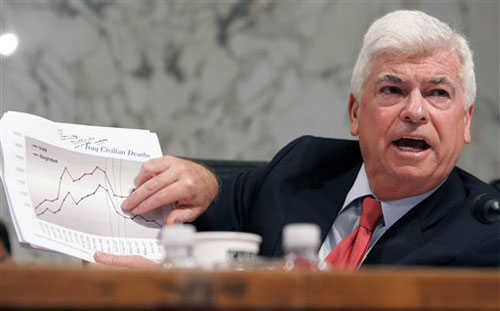Is Petraeus' Testimony Relevant to the Debate on Iraq?




Today, the much-anticipated testimony on the status of our combat mission in Iraq was delivered to the U.S. Senate by Ambassador Ryan Crocker and General David H. Petraeus, President Bush's top commander in Iraq. Yet for me, the anticipation surrounding the testimony rings hollow given the abject failure of the "surge" tactic to achieve political reconciliation or even a reduction in overall violence. But even more fundamentally, I question the relevance of a report on the merits of a particular tactic when the underlying strategy - that there is any military solution to the civil war in Iraq - has failed. As such, the debate we should be having is not whether this tactic is having limited success or not, but rather whether our involvement in this civil war is making our country safer.
The "surge" has failed to meet its stated goals. For all the White House talk about improvements in Iraqi security, we have just witnessed the bloodiest summer yet in Iraq. Are the 30,000 additional American troops helping clear some insurgent-run neighborhoods in Iraq? Absolutely. But these insurgents just move elsewhere in the country. As one soldier told me at Walter Reed after the surge began an hour-and-a-half after our soldiers leave following a month's work, the insurgents return. In an interview on CNN this summer, General Petraeus also confirmed that American forces had to return to some neighborhoods that had already been cleared. Little wonder one opinion poll conducted jointly by the BBC, ABC News and NHK of Iraqis revealed that approximately 70% of Iraqis believe security has actually deteriorated in the area covered by the US military surge of the past six months. This "whack-a-mole" strategy has led to the bloodiest summer of the war.
General Petraeus said at the outset of the "surge" that the point was to allow the Iraqi government some breathing room to come to some sort of political reconciliation. But this hasn't happened - as many as 7 in 10 Iraqis believe the surge has made political accommodation more difficult. It would appear the Iraqis are right; according to a recently released report on Iraq by the non-partisan Government Accountability Office, Iraq has failed to meet all but three of 18 congressionally mandated benchmarks for political and military progress. Iraq's government has been a disaster - and as Petraeus himself admits, the "surge" hasn't helped matters.
The "surge" is not a strategy, it is a tactic. And the strategy has failed because we are not safer. The overriding reason we are in Iraq is because President Bush believes the war makes America safer. There's no reason to believe it is. The same BBC/ABC/NHK survey suggests that nearly 60% of Iraqis see attacks on US-led forces as justified - 93% among Sunni Muslims, who make up almost all of al Anbar Province where the Administration touts so much progress. Meanwhile, America's reputation in the world is tarnished and America's ability to combat international terrorism impaired - the result of our continued involvement in Iraq. And as we expend hundreds of billions of dollars in Iraq and stretch our military thin, the Taliban is reemerging in Afghanistan and Osama Bin Laden is still at large. Safer? Hardly.
By every measure, the surge has failed - to secure Iraq, to help forge political reconciliation there, or make America safer.
The debate we should be having is not on how we change tactics, but how we change policy. It is clear to me, and as today's testimony reinforces, that half-measures will not change the policy of this White House. We need to send a clear message to the President and the Iraqis that it is time for a change of course. That is why I have stated that I will not support any measure that does not include a firm, enforceable deadline for redeployment. I urge other leaders in the party to join me.





























Posted September 11, 2007 | 11:57 AM (EST)